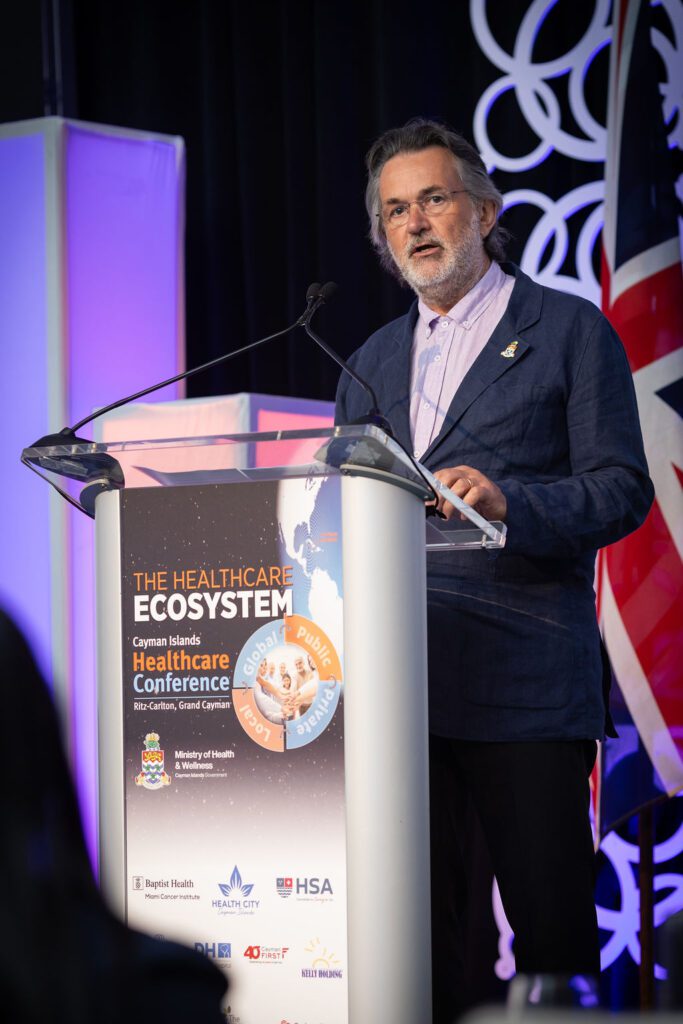Cayman: MHW Unveils Key Findings of the STEPS 2023 National Health Survey

Dr. Nick Gent Chief Medical Officer Ministry of Health and Wellness
Grand Cayman, Monday, 28 October 2024 – The Ministry of Health and Wellness disseminated key STEPS 2023 National Health Survey findings at the 15th annual Cayman Islands Health Care Conference, held at the Ritz Carlton from 17 to 19 October 2024. The STEPS National Health Survey was conducted across all three islands in 2023 to identify the national prevalence for risk factors of non-communicable diseases (NCDs) in the Cayman Islands.
The findings of the STEPS survey mark an important chapter in the Ministry’s vision to use a data-driven approach to inform policies and help to create programmes, services, and interventions that address the needs of the people of the Cayman Islands.

Minister for Health and Wellness Hon. Sabrina Turner
“I am very proud of the all the work that has gone into collecting, analysing and soon applying what is the most comprehensive data ever captured at a national level on the prevalence of NCD risk factors,” Minister for Health and Wellness, Hon. Sabrina Turner, said. “Yet our journey is just beginning; with this wealth of data in our hands, we are now all armed at an individual, family, community and government level to act on the information we have received and reclaim the health of our nation.”
Non-communicable diseases are the leading cause of death and disability in the world. According to the 2022 Compendium of Statistics, in the Cayman Islands, cardiovascular disease was the leading cause of death that year, followed by cancer, unintentional injuries, and then diabetes.

Rachel-Corbett-Cayman-Islands-National-Epidemiologist
The newly available STEPS survey data exposes important insights on undiagnosed disease in Cayman, treatment gaps, disparities in health outcomes, and missed opportunities for care, and it also marks the collection of new data that has never been available at national level.
In her presentation of the findings, Cayman Islands’ National Epidemiologist, Rachel Corbett, unpacked several key trends related to NCD risk factors. In her eye-opening presentation, Ms. Corbett revealed:
Undiagnosed disease: A large proportion of the population in Cayman are living with undiagnosed conditions, including raised blood pressure and diabetes. More than 1 in 3 people with raised blood pressure are undiagnosed. Despite the high contact with healthcare services among the population, the data reveal a clear opportunity for healthcare professionals to empower people with healthcare advice and education to improve their health outcomes.

Rachel Corbett Cayman Islands National Epidemiologist
Gaps in care: The survey data highlighted missed opportunities for care, as only 27% of Cayman’s population with raised blood pressure have been diagnosed and are on medication that is successfully managing their blood pressure. Alarmingly, undiagnosed high blood pressure was found to be significantly higher among younger adults aged 18 to 44 at 57%, than among those aged 45 to 69 years at 25.5%. Additionally, concerning diabetes monitoring, the data revealed that large proportions of the diabetic population are not receiving regular foot and eye exams, which are standard in determining diabetic retinopathy and diabetic foot ulcers.
Multiple risk factors: Nearly 50% of older adults were found to have 3 to 5 NCD risk factors, which significantly increases their chance of developing serious health problems and suggests a growing demand on healthcare services, as the prevalence of NCDs rises with age.
Longstanding and unchanged health risks: Despite numerous public health efforts since the previous STEPS National Health Survey in 2012, Ms. Corbett highlighted that there has been no significant change in the prevalence of behavioural risk factors such as diet and exercise, or in BMI. This lack of progress underscores the need for a review of current public health approaches to promoting healthier lifestyles and preventing NCDs.
Barriers to access to care: It cannot be ignored that finances and good health insurance play a crucial role in people being able to access the care that they need. 20% of Cayman households survive on less than $15,000 per year. And though 50% of the population are reported to be on a comprehensive insurance plan from a local provider, Chief Medical Officer Dr. Nick Gent, made this important observation in his remarks:
“The undiagnosed numbers of diabetics and hypertensives show us that poverty is causing people not just to be selective about what care they can afford to receive, but often that they are choosing not to seek any care at all. The cost, or fear of the cost, of health care is now a major barrier to many people. It is especially apparent in the scale of the diagnosed, but untreated, numbers of hypertensives and diabetics. These are people who are knowingly taking a risk with their own health and fitness but having to make that choice faced by other more pressing needs.”
For the first time at national level, the STEPS 2023 National Health Survey has provided valuable data on cholesterol levels, raised blood sugar, and vaping prevalence, which provide government officials, health care providers, NPO partners, and Cayman residents with a clearer picture of the health challenges the nation faces and will allow for more targeted and effective interventions.
Various collaborative sessions are planned by the Ministry to share the results of the STEPS Survey across multiple stakeholders with the aim of bridging gaps as to how the results can best be utilised to achieve better population health.
A full report of the STEPS 2023 National Health Survey data and findings will be available from 1 December 2024, on www.gov.ky/steps<http://www.gov.ky/steps>





